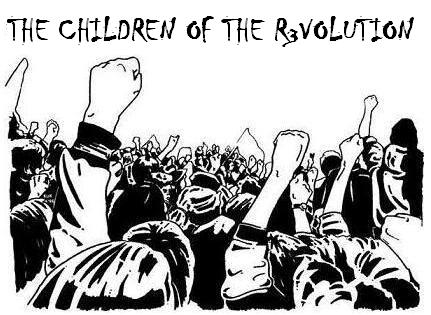
I hesitated to publish this article. I am not a pessimistic person by nature. I typically tend to expect the best from people, though I plan for the worst. As I look down the road, however, I am unable to see my way through to returning America to her “ideal” state, that is to say the state envisioned and outlined in the Constitution and Declaration of Independence (maybe I’ve been spending too much time listening to Hariolor…). This is troubling to me. I believe that a democratic republic (emphasis on the republic) is the best system of government devised by man thus far. While the virtues of the system are far too abundant to enumerate here, the one trait that radically sets it apart from its preceding systems of government is the concept of peaceful revolution. This is perhaps one of my favorite aspects of the republican model; the people, without force of arms or bloodshed, can expel their rulers with regularity and install new ideas and persons in government according to their wants.
But we have sadly reached a point in our republic where even the peaceful revolution has been watered down and neutered. Due to a lack of choice in our heavily entrenched two-party system, overthrowing those perpetuating the corruption of our republic is close to impossible. It isn’t that there’s no one left in our government who has the will to turn back the tide. It’s that they’ll never proliferate in numbers great enough to do it. What results is a compromise with the corruption itself and an attempt to contain the damage already done. This strategy exists in medicine as well, and is typically aimed merely at buying time, not cheating death. Eventually, the corruption of our republic will kill it, if it hasn’t already. I fear that we’re in our death throes.
Thomas Jefferson once said, “When once a republic is corrupted, there is no possibility of remedying any of the growing evils but by removing the corruption and restoring its lost principles; every other correction is either useless or a new evil.” Well, we're up to our eyeballs in new evils. But unfortunately Mr. Jefferson would have the devil of a time in our modern American republic. He’d probably be lambasted as a member of the kook fringe, relegated to the Libertarian Party or worse. Both Democrats and Republicans would mock him as an unrealistic novice and hopeless ideologue, if they bothered to pay him any mind at all. In all likelihood he would never be elected to public office, let alone given a platform outside of talk radio to express himself. And therein lies the problem. If the ideas of men like Thomas Jefferson, George Washington and James Madison would find no traction in the mainstream political debate, then we’ve wandered way off the reservation.
This is not to say that our republic should not adapt to dynamics that the Founders were unable to anticipate: nuclear weapons, hedge funds, the internet, etc. Indeed, one must wonder what Jefferson would have to say for himself in the nuclear era, considering his remarks after drastically downsizing the military as president and scrapping most of the navy, saying that citizen soldiers would arise to defend the nation were it attacked. Would he feel the same way when, in the modern era, the attack would result in the destruction of entire cities, including the seat of government? I doubt it. But because these new challenges to our republic exist, do they nullify the entire philosophy of government that men like Jefferson espoused? Of course not. They merely force us to address those challenges in responsible ways that do not unduly expand the powers of the federal government. This can be extremely difficult (hence the word challenges). The problem, however, is that the standard operating procedure for the federal government has been simplified to avoid the difficulty by adopting the notion that every issue is a national issue, and that no issue can remain untouched by the hand of government.
The moment this methodology was adopted by the federal government, the clock began to wind down to the death of our republic. We could have stopped the clock or turned it back at any time. But the Great Depression took us past the point of no return. When the federal government began doling out money to its citizens that they did not earn in the form of social security, the cancer on our republic turned terminal. These are the sorts of institutional changes that can never be rolled back. No one dares speak of social security reform; it is tantamount to political suicide. It opened the Pandora’s Box of bread and circus programs for which the premise is that economic redistribution is a legitimate role for federal government. And now the sand in the hour glass is running out. Sadly, even the slow, withering death of American freedom did not go unforseen by our Founders. John Adams cautioned, "Remember, democracy never lasts long. It soon wastes, exhausts, and murders itself. There never was a democracy yet that did not commit suicide."
So what recourse is there? For now, we’ll limp along in our steady decline, voting for candidates who we feel will cause the least damage to our ailing republic. But eventually the pretense that we live in a free society will become laughable (for many it already is). By then, I suppose, it will be too late for us to take action, as the government will surely have taken away all the tools by which we may protect our liberty. Do I, the optimist, see any other endgame? Not unless the American public elects a Libertarian supermajority to power for the next few decades. And even then we may just be buying time.







2 comments:
Don't give up hope brother. Politicians must still be elected, people can still vote. Our salvation, I think, is in our education and our citizens.
Respectfully, I disagree that our politicians are to blame for the current situation, they are, of course, elected by us...so they are a reflection of our values. Let's face it...our values need some work.
Of course I agree that our politicians are a product of our citizenry. Which seems to me to make the situation all the more dire. If our future rests with our voting youth, then I shudder to think what their public and higher education will make of this country.
We must push on, as you say. Our strategy to at least stem the tide that is eroding our republic (as we cannot put an end to many of the offending policies that are now institutions in our political system) must be educating the youth. If we can instill in them even the slightest bit of appreciation for the principles this country was founded on, then there is a distant hope.
Post a Comment